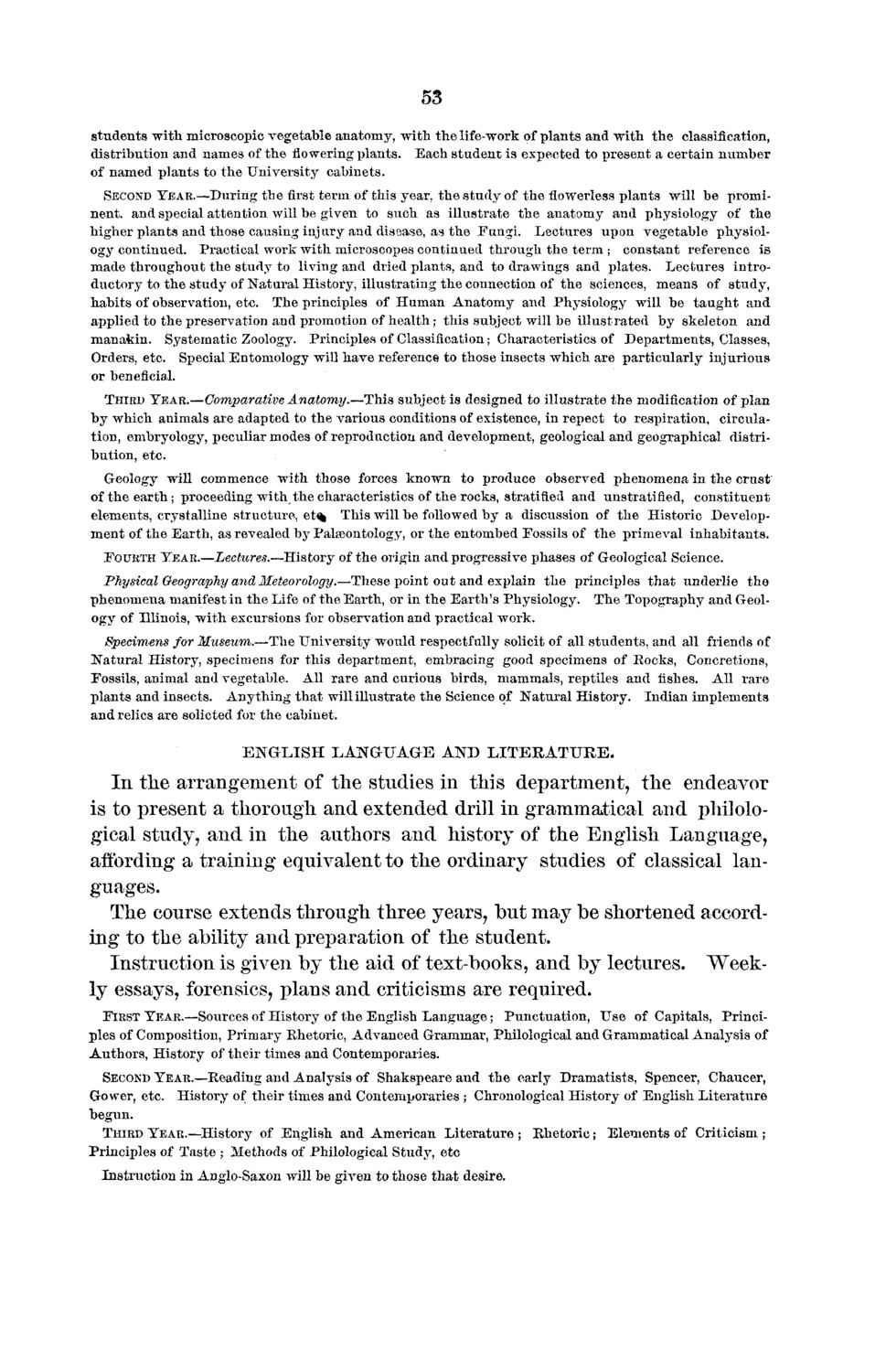| |
| |
Caption: Board of Trustees Minutes - 1872
This is a reduced-resolution page image for fast online browsing.

EXTRACTED TEXT FROM PAGE:
53 students with microscopic vegetable anatomy, with the life-work of plants and with the classification, distribution and names of the flowering plants. Each student is expected to present a certain number of named plants to the University cabinets. SECOND YEAR.—During the first term of this year, the study of the flowerless plants will be prominent, and special attention will be given to such as illustrate the anatomy and physiology of the higher plants and those causing injury and disease, as the Fungi. Lectures upon vegetable physiology continued. Practical work with microscopes continued through, the term ; constant reference is made throughout the study to living and dried plants, and to drawings and plates. Lectures introductory to the study of Natural History, illustrating the connection of the sciences, means of study, habits of observation, etc. The principles of Human Anatomy and Physiology will be taught and applied to the preservation and promotion of health; this subject will be illustrated by skeleton and manakin. Systematic Zoology. Principles of Classification; Characteristics of Departments, Classes, Orders, etc. Special Entomology will have reference to those insects which are particularly injurious or beneficial. THIRD YEAR.—Comparative Anatomy.—This subject is designed to illustrate the modification of plan by which animals are adapted to the various conditions of existence, in repect to respiration, circulation, embryology, peculiar modes of reproduction and development, geological and geographical distribution, etc. Geology will commence with those forces known to produce observed phenomena in the crust of the earth; proceeding with the characteristics of the rocks, stratified and unstratified, constituent elements, crystalline structure, et% This will be followed by a discussion of the Historic Development of the Earth, as revealed by Palaeontology, or the entombed Fossils of the primeval inhabitants. FOURTH YEAR.—Lectures.—History of the origin and progressive phases of Geological Science. Physical Geography and Meteorology.—These point out and explain the principles that underlie the phenomena manifest in the Life of the Earth, or in the Earth's Physiology. The Topography and Geology of Hlinois, with excursions for observation and practical work. Specimens for Museum.—The University would respectfully solicit of all students, and all friends of Natural History, specimens for this department, embracing good specimens of Rocks, Concretions, Fossils, animal and vegetable. All rare and curious birds, mammals, reptiles and fishes. All rare plants and insects. Anything that will illustrate the Science of Natural History. Indian implements and relics are solicted for the cabinet. E N G L I S H L A N G U A G E AND L I T E R A T U R E . In the arrangement of the studies in this department, the endeavor is to present a thorough and extended drill in grammatical and philological study, and in the authors and history of the English Language, affording a training equivalent to the ordinary studies of classical languages. The course extends through three years, but may be shortened according to the ability and preparation of the student. Instruction is given by the aid of text-books, and by lectures. Weekly essays, forensics, plans and criticisms are required. FIRST YEAR.—Sources of History of the English Language; Punctuation, Use of Capitals, Principles of Composition, Primary Rhetoric, Advanced Grammar, Philological and Grammatical Analysis of Authors, History of their times and Contemporaries. SECOND YEAR.—Reading and Analysis of Shakspeare and the early Dramatists, Spencer, Chaucer, Gower, etc. History of their times and Contemporaries ; Chronological History of English Literature begun. THIRD YEAR.—History of English and American Literature ; Rhetoric; Elements of Criticism ; Principles of Taste ; Methods of Philological Study, etc Instruction in Anglo-Saxon will be given to those that desire.
| |